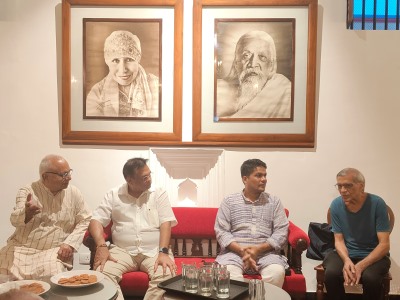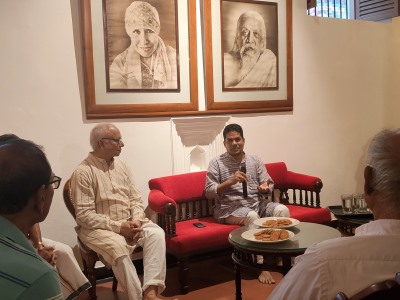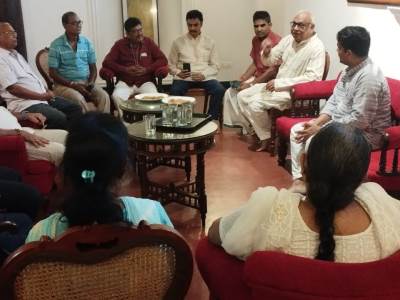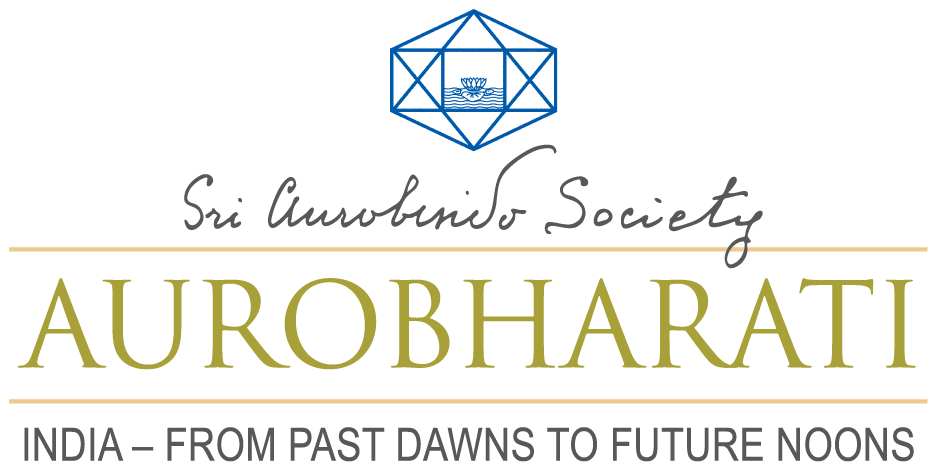Study Circle Group on Bharat Vaibhav: Diversity of Expressions & the Cultural Unity of India
Location: MatriNiketan
Institute: AuroBharati
A new spirit of oneness will take hold of the human race. -Sri Aurobindo
“A widest and highest spiritualising of life on earth is the last vision of all that vast and unexampled seeking and experiment in a thousand ways of the soul’s outermost and innermost experience which is the unique character of [India’s] past; this in the end is the mission for which she was born and the meaning of her existence.”
– Sri Aurobindo
 On the significant occasion of Siddhi Day, AuroBharati, under the auspices of the Sri Aurobindo Society, convened a ‘Study Circle Group Bharat Vaibhav: Diversity of Expressions & the Cultural Unity of India’ for the devotees associated with the Sri Aurobindo Centre in Bihar, Jharkhand, and Maharashtra at Matriniketan, Sri Aurobindo Society, Puducherry.
On the significant occasion of Siddhi Day, AuroBharati, under the auspices of the Sri Aurobindo Society, convened a ‘Study Circle Group Bharat Vaibhav: Diversity of Expressions & the Cultural Unity of India’ for the devotees associated with the Sri Aurobindo Centre in Bihar, Jharkhand, and Maharashtra at Matriniketan, Sri Aurobindo Society, Puducherry.
Dr. Kishor Kumar Tripathy, Member Secretary of AuroBharati, Sri Aurobindo Society, Puducherry, delivered a discourse on the aforementioned theme, asserting that Bharat’s culture is unparalleled globally. He highlighted the extensive history that spans thousands of years, characterized by diverse influences and rich traditions. Dr. Tripathy underscored Sri Aurobindo’s message regarding India’s unity, stating, “India today is free but she has not achieved unity.”
 He also referenced the Mother’s vision of India as a land of resurrection, proclaiming, “India will be the land of its resurrection – the resurrection to a higher and truer life.” Furthermore, he articulated that India is celebrated for its vast cultural diversity, which manifests in various forms, showcasing its ability to assimilate and adapt to numerous influences while preserving fundamental customs. He elaborated on the aims and objectives of Bharat Vaibhav, a program of AuroBharati and the Sri Aurobindo Society, which seeks to delve into the multifaceted aspects of Indian culture within the framework of Sri Aurobindo and the Mother’s teachings.
He also referenced the Mother’s vision of India as a land of resurrection, proclaiming, “India will be the land of its resurrection – the resurrection to a higher and truer life.” Furthermore, he articulated that India is celebrated for its vast cultural diversity, which manifests in various forms, showcasing its ability to assimilate and adapt to numerous influences while preserving fundamental customs. He elaborated on the aims and objectives of Bharat Vaibhav, a program of AuroBharati and the Sri Aurobindo Society, which seeks to delve into the multifaceted aspects of Indian culture within the framework of Sri Aurobindo and the Mother’s teachings.
Dr. Tripathy highlighted the significance of the teacher-student tradition and the expression of concepts through scriptures rooted in the teachings of Sri Aurobindo and the Mother. He noted that the cross-cultural connections across borders illustrate India’s cultural unity. He emphasized that the revitalization of Indian culture necessitates an indigenous perspective. Key elements of the discussion included India’s sacred landscapes, cultural heritage, and the preservation of community culture, all of which are essential for maintaining the nation’s cultural coherence.
 The Bharat Vaibhav project will concentrate on interdisciplinary research into the distinctive features of Indian culture, examining the interplay between culture and civilization, the attributes of Indian culture in relation to various art forms, the points of diversity alongside underlying unity, and the interconnections among different cultures.
The Bharat Vaibhav project will concentrate on interdisciplinary research into the distinctive features of Indian culture, examining the interplay between culture and civilization, the attributes of Indian culture in relation to various art forms, the points of diversity alongside underlying unity, and the interconnections among different cultures.
Distinguished representatives from various branches, including Shri Vinay Kumar Sinha (Secretary, Sri Aurobindo Society, Gaya Centre, Bihar), Shri Vinod Marodia (Founder Member, Sri Aurobindo Society, Dehri-On-Sone Branch, Bihar), Shri Ajay Gupta (Sri Aurobindo Society, Amaravati Branch, Maharashtra), Shri Dillip Patel (Sri Aurobindo Society branch, Gujarat), and other devotees contributed valuable insights on the subject.



